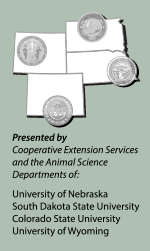Weed Control During, After Drought
by Kindra Gordon, field editor, Angus Journal

Darrell Deneke shared his experiences in controlling weeds during and after drought.
RAPID CITY, S.D. (Dec. 4, 2013) — Most rangelands are always in some stage of drought — either they are in a drought, going into one, or just coming out of one. As grasses and forbs become stressed from drought or overgrazing, bare ground areas can provide opportunities for weeds to flourish, shared Darrell Deneke, integrated pest management coordinator with South Dakota Statue University (SDSU) Extension.
Deneke shared his experiences in controlling weeds during and after drought at the Range Beef Cow Symposium in Rapid City, S.D., Dec. 3-5. The biennial event is co-hosted by SDSU, Colorado State University, University of Wyoming and University of Nebraska.
“Invasive plants tend to have a quicker growth and maturity. Their goal is to produce seed quickly,” noted Deneke.
To combat weeds with herbicides, he said the following four factors should be considered:
- Timing. Young plants in a vegetative state are most vulnerable.
- Rate. Using the high end of the labeled rate range is advised during drought.
- Utilize recommended adjuvants or additives.
- Coverage. You want good coverage to get as much herbicide into the plant as possible.
Deneke noted that an increase in native forbs — sageworts, goldenrods, asters and sunflowers — is sometimes seen during drought due to stress on grasses. He advised ignoring these and explained that grasses are good at coming back and competing once the drought is over. Native forbs and some weeds can also be a feed source for livestock during drought.
Overall, Deneke said the best management program in dealing with drought is to maintain a good healthy grass stand before a drought hits. If weeds become a problem, it’s important to be aggressive in treating them quickly and at the appropriate time in their growth cycle.
As pastures recuperate after a drought, Deneke said deferred grazing gives grasses an opportunity to build up root reserves, and develop more plant growth. This can speed recovery of the land.
Deneke spoke Wednesday at RBCS XXIII. Visit the Newsroom at www.rangebeefcow.com/2013 to view his PowerPoint and listen to his presentation.
---------------------
The RBCS is a biennial educational symposium offering practical production management information. It is sponsored by the Cooperative Extension Service and animal science departments of the University of Wyoming, South Dakota State University, Colorado State University and the University of Nebraska.
Comprehensive coverage of the symposium is available online at www.rangebeefcow.com. Compiled by the Angus Journal editorial team, the site is made possible through sponsorship of LiveAuctions.tv and the cooperation of the host committee.
Editor’s Note: This article was written under contract or by staff of the Angus Journal. To request reprint permission and guidelines, contact Shauna Rose Hermel, editor, at 816-383-5270.


